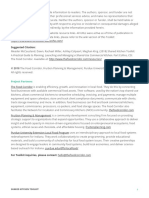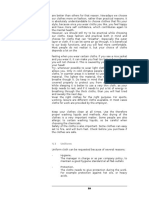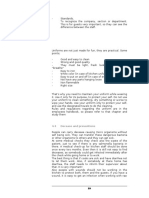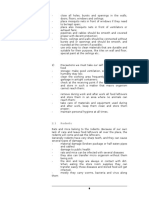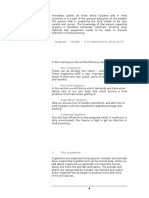0 ratings0% found this document useful (0 votes)
40 viewsDig Deeper
Dig Deeper
Uploaded by
mohamed.mauroofViruses use the resources of host organisms like humans to multiply, causing the host's cells to die. Viruses cannot multiply on their own and need a living host. Hepatitis A is a dangerous virus found in some foods like seafood and products from rivers. It can cause jaundice, fever, and vomiting. Once infected, a person will never be cured of hepatitis A. Proper hygiene and avoiding raw uncertified oysters and river products can prevent infection. HIV causes AIDS and ultimately death by destroying the immune system. It is rarely transmitted by food as the virus dies quickly outside the body, but is transmitted through sexual contact, blood contact, or wounds.
Copyright:
© All Rights Reserved
Available Formats
Download as PDF, TXT or read online from Scribd
Dig Deeper
Dig Deeper
Uploaded by
mohamed.mauroof0 ratings0% found this document useful (0 votes)
40 views1 pageViruses use the resources of host organisms like humans to multiply, causing the host's cells to die. Viruses cannot multiply on their own and need a living host. Hepatitis A is a dangerous virus found in some foods like seafood and products from rivers. It can cause jaundice, fever, and vomiting. Once infected, a person will never be cured of hepatitis A. Proper hygiene and avoiding raw uncertified oysters and river products can prevent infection. HIV causes AIDS and ultimately death by destroying the immune system. It is rarely transmitted by food as the virus dies quickly outside the body, but is transmitted through sexual contact, blood contact, or wounds.
Original Title
dig deeper
Copyright
© © All Rights Reserved
Available Formats
PDF, TXT or read online from Scribd
Share this document
Did you find this document useful?
Is this content inappropriate?
Viruses use the resources of host organisms like humans to multiply, causing the host's cells to die. Viruses cannot multiply on their own and need a living host. Hepatitis A is a dangerous virus found in some foods like seafood and products from rivers. It can cause jaundice, fever, and vomiting. Once infected, a person will never be cured of hepatitis A. Proper hygiene and avoiding raw uncertified oysters and river products can prevent infection. HIV causes AIDS and ultimately death by destroying the immune system. It is rarely transmitted by food as the virus dies quickly outside the body, but is transmitted through sexual contact, blood contact, or wounds.
Copyright:
© All Rights Reserved
Available Formats
Download as PDF, TXT or read online from Scribd
Download as pdf or txt
0 ratings0% found this document useful (0 votes)
40 views1 pageDig Deeper
Dig Deeper
Uploaded by
mohamed.mauroofViruses use the resources of host organisms like humans to multiply, causing the host's cells to die. Viruses cannot multiply on their own and need a living host. Hepatitis A is a dangerous virus found in some foods like seafood and products from rivers. It can cause jaundice, fever, and vomiting. Once infected, a person will never be cured of hepatitis A. Proper hygiene and avoiding raw uncertified oysters and river products can prevent infection. HIV causes AIDS and ultimately death by destroying the immune system. It is rarely transmitted by food as the virus dies quickly outside the body, but is transmitted through sexual contact, blood contact, or wounds.
Copyright:
© All Rights Reserved
Available Formats
Download as PDF, TXT or read online from Scribd
Download as pdf or txt
You are on page 1of 1
organisms damage.
They need other organisms to develop
themselves. They multiply causing living cells of for example
the humans to die. The virus uses further all recourses of the
“host”, like water, air, temperature etc. etc. Viruses cannot
multiply
when they are in our food, but they can stay alive. In most
cases viruses die when heating the products up. Cold
environments do not damage the viruses, they stay alive,
but will not multiply so fast. A famous virus that is especially
in Asia a huge disaster is the “hepatitis A” The virus attacks
the liver and can stand heating. It is know to cause general
tiredness, fever, and throwing up. Also the color of the skin
will turn yellow. Mostly the virus is in seafood, but can also
be in other products,
however that chance is smaller. The most dangerous are
river products, where the risk is even more higher than sea
products.
Once infected with hepatitis A, you will most likely never
cure again. To prevent you from getting this virus, do the
following;
- maintain good personal hygiene
- use only certified seafood, and not from the river
- avoid eating uncertified oysters raw
- do not allow people with the virus to work
- after a visit to the toilet, wash your hands properly
Another dangerous virus is the so called HIV. This virus will
cause AIDS, where in most cases you will die from, because
the virus destroys the natural protection systems of your
body, and you will get numerous diseases that can lead to
death. The chance that you will get HIV infection by food is
extremely small, as when the virus stays outside of the body,
it will die very fast. The virus is transferable by sexual
contacts, blood contact or other body contact where wounds
are openly exposed. The virus get killed if heated up to 60
gr. C, and also the stomach juices kill this virus.
END PART II
Refer to your assigned supervisor to discuss any questions
you may have before continuing to the next section. Only
once you understand all the contents, move on to the next
section.
Hygiene
21
You might also like
- No More Yeast Infection: The Complete Guide on Yeast Infection Symptoms, Causes, Treatments & A Holistic Approach to Cure Yeast Infection, Eliminate Candida, Naturally & PermanentlyFrom EverandNo More Yeast Infection: The Complete Guide on Yeast Infection Symptoms, Causes, Treatments & A Holistic Approach to Cure Yeast Infection, Eliminate Candida, Naturally & PermanentlyRating: 5 out of 5 stars5/5 (8)
- Common Communicable Disease in The CommunityDocument5 pagesCommon Communicable Disease in The CommunityMaristelaMolinaNo ratings yet
- The Stomach Germs You Need To AvoidDocument2 pagesThe Stomach Germs You Need To Avoidtsudhakar99No ratings yet
- What Are Foodborne Illnesses?Document5 pagesWhat Are Foodborne Illnesses?Sunday JamesNo ratings yet
- Disease Preventions and ControlDocument9 pagesDisease Preventions and ControlPhoebe Grace BeduaNo ratings yet
- English WorkDocument3 pagesEnglish WorkIgreja Adventista Do Sétimo Dia Ancuabe-SedeNo ratings yet
- InstantDocument4 pagesInstantadvaitmansNo ratings yet
- Bio HazardsDocument11 pagesBio HazardsMahaprasad RathNo ratings yet
- Bio HazardsDocument11 pagesBio HazardsMahaprasad RathNo ratings yet
- Good and EvilDocument1 pageGood and EvilbrunolunaestebanNo ratings yet
- What Are VirusesDocument2 pagesWhat Are VirusesFaiz IzmeeNo ratings yet
- Smart Immunity - How Diet and Lifestyle Can Help You Stay Healthy in The Time of COVID-19Document14 pagesSmart Immunity - How Diet and Lifestyle Can Help You Stay Healthy in The Time of COVID-19stergilibraryNo ratings yet
- Types of Food PoisoningDocument28 pagesTypes of Food Poisoningmtkhan52-1No ratings yet
- Basic Sanitation PresentationDocument155 pagesBasic Sanitation PresentationsmithmichielNo ratings yet
- Pathogens Gallery Walk PostersDocument5 pagesPathogens Gallery Walk Postersapi-293084509No ratings yet
- SURVIVAL GUIDE TO CORONAVIRUS: How to Keep your Family Safe amidst COVID19From EverandSURVIVAL GUIDE TO CORONAVIRUS: How to Keep your Family Safe amidst COVID19No ratings yet
- Food Safety Fundamentals (Pamplet)Document2 pagesFood Safety Fundamentals (Pamplet)Anith PutraNo ratings yet
- What Is E. Coli and Where Does It Come From?Document3 pagesWhat Is E. Coli and Where Does It Come From?city1212No ratings yet
- What Are Bacteria?Document5 pagesWhat Are Bacteria?Carmen Julia VallesNo ratings yet
- HOW To SURVIVE The VIRUS - A Practical Guide To Face Anxiety and Social Distancing With A Positive Mindset in The Era of PandemicDocument86 pagesHOW To SURVIVE The VIRUS - A Practical Guide To Face Anxiety and Social Distancing With A Positive Mindset in The Era of PandemicAkan AkkayaNo ratings yet
- Rabies HE FinalDocument8 pagesRabies HE FinalRikkimae NaagNo ratings yet
- CHAPTER 1-Public HealthDocument18 pagesCHAPTER 1-Public HealthsyakirohNo ratings yet
- Protect Yourself: 1. Handle & Prepare Food SafelyDocument7 pagesProtect Yourself: 1. Handle & Prepare Food SafelyFhel MarNo ratings yet
- Pseudomonas Infection Is Caused by Strains of BacteriaDocument3 pagesPseudomonas Infection Is Caused by Strains of Bacteriaanti girlzNo ratings yet
- Smart Immunity - How Diet and Lifestyle Can Help You Stay Healthy in The Time of COVID-19Document13 pagesSmart Immunity - How Diet and Lifestyle Can Help You Stay Healthy in The Time of COVID-19Ritu ShewaniNo ratings yet
- Infectious DiseasesDocument5 pagesInfectious DiseaseslmtrumataNo ratings yet
- Microbes and Diseases Year 11C1Document8 pagesMicrobes and Diseases Year 11C1Sam RatnamNo ratings yet
- Human DiseasesDocument34 pagesHuman DiseasesAgat Mayrani GandhiNo ratings yet
- Someone You Know Has Hepatitis CDocument2 pagesSomeone You Know Has Hepatitis CPKIDs100% (3)
- Fortuno MicroparaDocument24 pagesFortuno MicroparaJuli AhhNo ratings yet
- Frias, Sid Artemis B. Bsn3ADocument2 pagesFrias, Sid Artemis B. Bsn3ASid Artemis FriasNo ratings yet
- Don't Get Sick.: A Panic-Free Pocket Guide to Living in a Germ-Filled WorldFrom EverandDon't Get Sick.: A Panic-Free Pocket Guide to Living in a Germ-Filled WorldNo ratings yet
- Nurs AssDocument6 pagesNurs Asstefesih tube ተፈስሕ ቲዮብNo ratings yet
- Lesson 1 - Our Invisible EnemiesDocument6 pagesLesson 1 - Our Invisible EnemiesArianne Kaye LabisteNo ratings yet
- Eunice TrabalhoDocument8 pagesEunice TrabalhoRalson Da Ana FlorianoNo ratings yet
- CHAPTER 1-Public Health (Environmental Pollution and Control)Document18 pagesCHAPTER 1-Public Health (Environmental Pollution and Control)muhdakmaladnan100% (4)
- Leptospirosis: Baron Lucien M, Garcia San Lazaro Hospital Olivarez College /BSN IV Group 2 Mrs. LofamiaDocument5 pagesLeptospirosis: Baron Lucien M, Garcia San Lazaro Hospital Olivarez College /BSN IV Group 2 Mrs. LofamiablucienNo ratings yet
- Food Safety PowerPoint-1Document27 pagesFood Safety PowerPoint-1Maria QadirNo ratings yet
- Schistosomiasis (Bilharzia) : How You Get SchistosomiasisDocument4 pagesSchistosomiasis (Bilharzia) : How You Get SchistosomiasisDennis NjorogeNo ratings yet
- Meet The Microbes: Friends or Enemies?Document5 pagesMeet The Microbes: Friends or Enemies?Moamer AhmedNo ratings yet
- Parasites That Infect Humans - Liver DoctorDocument29 pagesParasites That Infect Humans - Liver DoctorDan Bo100% (1)
- DefinitionDocument15 pagesDefinitionSimona IonitaNo ratings yet
- Bio ChemDocument4 pagesBio ChemAubrey john GracioNo ratings yet
- Human & Social Biology PROJECTDocument31 pagesHuman & Social Biology PROJECTSuperFly Smith100% (1)
- Final Hand in 1Document14 pagesFinal Hand in 1lauraNo ratings yet
- Yy Y Yyyyy Yy Y Yyyyy Y Yyyyyyyyyyyyy Y Yyy Y Yy Yyyyy Yyyyy Y Y Yyyyyyyyyy Y Y Yyyy Y Y Y Yy Yy Y Y Y Y Y YDocument4 pagesYy Y Yyyyy Yy Y Yyyyy Y Yyyyyyyyyyyyy Y Yyy Y Yy Yyyyy Yyyyy Y Y Yyyyyyyyyy Y Y Yyyy Y Y Y Yy Yy Y Y Y Y Y YPutu MahendraNo ratings yet
- Hiv, Aids, StiDocument48 pagesHiv, Aids, StiEvelyn PinedaNo ratings yet
- Case Analysis 2Document7 pagesCase Analysis 2Shane Fross SeñedoNo ratings yet
- Rabies: 1 and 3 PeopleDocument6 pagesRabies: 1 and 3 PeopleDumapis RichardNo ratings yet
- Disease TableDocument4 pagesDisease TableyputetvihmffywclrzNo ratings yet
- Power Point On Chicken PoxDocument9 pagesPower Point On Chicken PoxSpongebobGGG100% (1)
- What Is HazardDocument21 pagesWhat Is Hazardnecely babeloniaNo ratings yet
- Intro To Hiv and AidsDocument14 pagesIntro To Hiv and Aidssalvineobonyo7777No ratings yet
- VirusDocument12 pagesVirusMohammad AtifNo ratings yet
- Biological Hazards Carried by The FoodDocument22 pagesBiological Hazards Carried by The FoodSylene PacasNo ratings yet
- Food Borne Hazards/ContaminantsDocument53 pagesFood Borne Hazards/ContaminantsKrison Jake ArticuloNo ratings yet
- Aids/ Hiv Four Hour Course Course #100 For Initial Licensure or Endorsement Meets Florida RequirementsDocument26 pagesAids/ Hiv Four Hour Course Course #100 For Initial Licensure or Endorsement Meets Florida Requirementsrozsheng100% (1)
- Vaccination Is A Way of Preventing Diseases Caused by Viruses. Vaccines Simulate ADocument9 pagesVaccination Is A Way of Preventing Diseases Caused by Viruses. Vaccines Simulate ASabling DritzcNo ratings yet
- Food SafetyDocument15 pagesFood SafetynanoiNo ratings yet
- GastroenteritisDocument3 pagesGastroenteritisLura Xstilice B. GalinatoNo ratings yet
- Fire HeartDocument1 pageFire Heartmohamed.mauroofNo ratings yet
- Rachael Miller Ashley Colpaart Meghan King Dawn Meader MccauslandDocument1 pageRachael Miller Ashley Colpaart Meghan King Dawn Meader Mccauslandmohamed.mauroofNo ratings yet
- Soaking Time PDFDocument1 pageSoaking Time PDFmohamed.mauroofNo ratings yet
- Polop PDFDocument1 pagePolop PDFmohamed.mauroofNo ratings yet
- The Sensitive Skin of The HandsDocument1 pageThe Sensitive Skin of The Handsmohamed.mauroofNo ratings yet
- Quest Mike PDFDocument1 pageQuest Mike PDFmohamed.mauroofNo ratings yet
- 4.1 Maintenance of The Body The SkinDocument1 page4.1 Maintenance of The Body The Skinmohamed.mauroofNo ratings yet
- Oike MasterDocument1 pageOike Mastermohamed.mauroofNo ratings yet
- Hay TimeDocument1 pageHay Timemohamed.mauroofNo ratings yet
- Stew BorwnDocument1 pageStew Borwnmohamed.mauroofNo ratings yet
- Trust OnnoDocument1 pageTrust Onnomohamed.mauroofNo ratings yet
- Table TopsDocument1 pageTable Topsmohamed.mauroofNo ratings yet
- Temporry PottuDocument1 pageTemporry Pottumohamed.mauroofNo ratings yet
- PH Scale, From 0 To 14: OxygenDocument1 pagePH Scale, From 0 To 14: Oxygenmohamed.mauroofNo ratings yet
- Blank FigDocument1 pageBlank Figmohamed.mauroofNo ratings yet
- Bacteria That Causes Food SpoilageDocument1 pageBacteria That Causes Food Spoilagemohamed.mauroofNo ratings yet
- Prevention of Macro OrganismsDocument1 pagePrevention of Macro Organismsmohamed.mauroofNo ratings yet
- Humidity / Water: Temperature Scale For BacteriaDocument1 pageHumidity / Water: Temperature Scale For Bacteriamohamed.mauroofNo ratings yet
- Done TrackDocument1 pageDone Trackmohamed.mauroofNo ratings yet
- MacronnDocument1 pageMacronnmohamed.mauroofNo ratings yet
- At The Receiving AreaDocument1 pageAt The Receiving Areamohamed.mauroofNo ratings yet
- 2.2 Insects and Spiders (And Spider Family)Document1 page2.2 Insects and Spiders (And Spider Family)mohamed.mauroofNo ratings yet
- Wire SeamDocument1 pageWire Seammohamed.mauroofNo ratings yet
- Refrigerators, PDFDocument1 pageRefrigerators, PDFmohamed.mauroofNo ratings yet
- C. Decease Causing Micro OrganismsDocument1 pageC. Decease Causing Micro Organismsmohamed.mauroofNo ratings yet
- Intro: "Health Is The Condition of Completely Physical, Mental and Social Well Being Without Illness or Weakness"Document1 pageIntro: "Health Is The Condition of Completely Physical, Mental and Social Well Being Without Illness or Weakness"mohamed.mauroofNo ratings yet
- Hygiene - Health - It Is Important To All of Us!!!!Document1 pageHygiene - Health - It Is Important To All of Us!!!!mohamed.mauroofNo ratings yet
- Product Temperatu Re Condition Comments: Log Sheet NR: LOG004Document1 pageProduct Temperatu Re Condition Comments: Log Sheet NR: LOG004mohamed.mauroofNo ratings yet
- From The Receiver, The Assigned PDFDocument1 pageFrom The Receiver, The Assigned PDFmohamed.mauroofNo ratings yet
- Water and Ice Sample Testing: Log Sheet NR: LOG002Document1 pageWater and Ice Sample Testing: Log Sheet NR: LOG002mohamed.mauroofNo ratings yet






























































